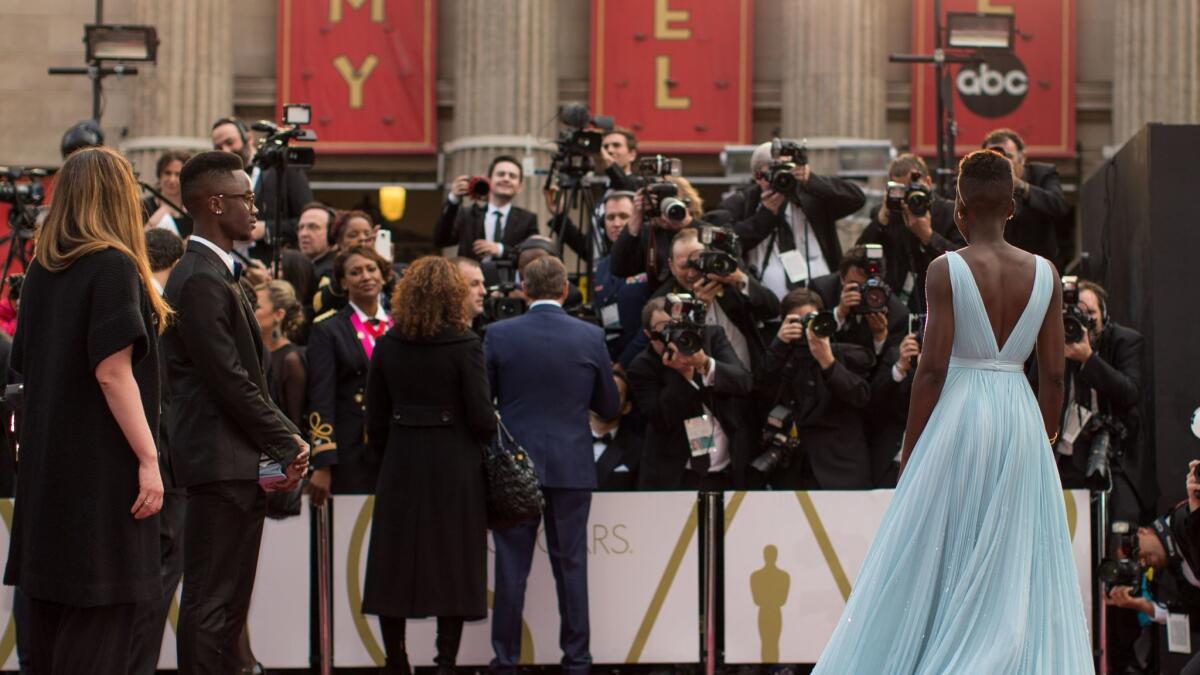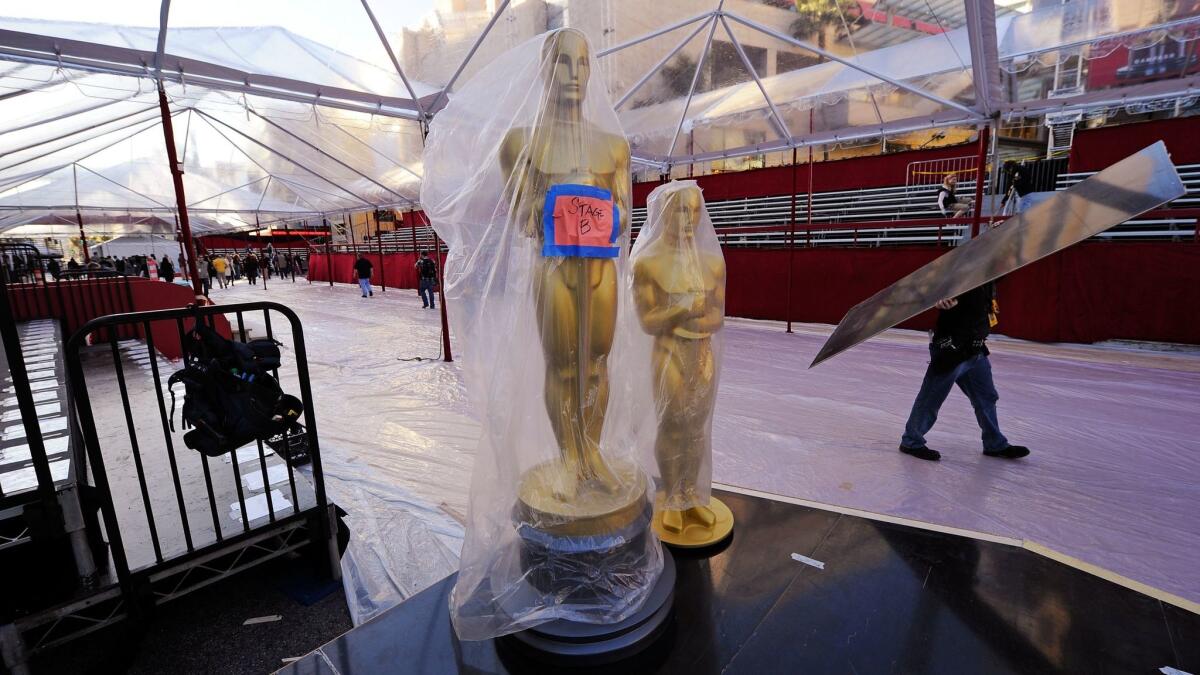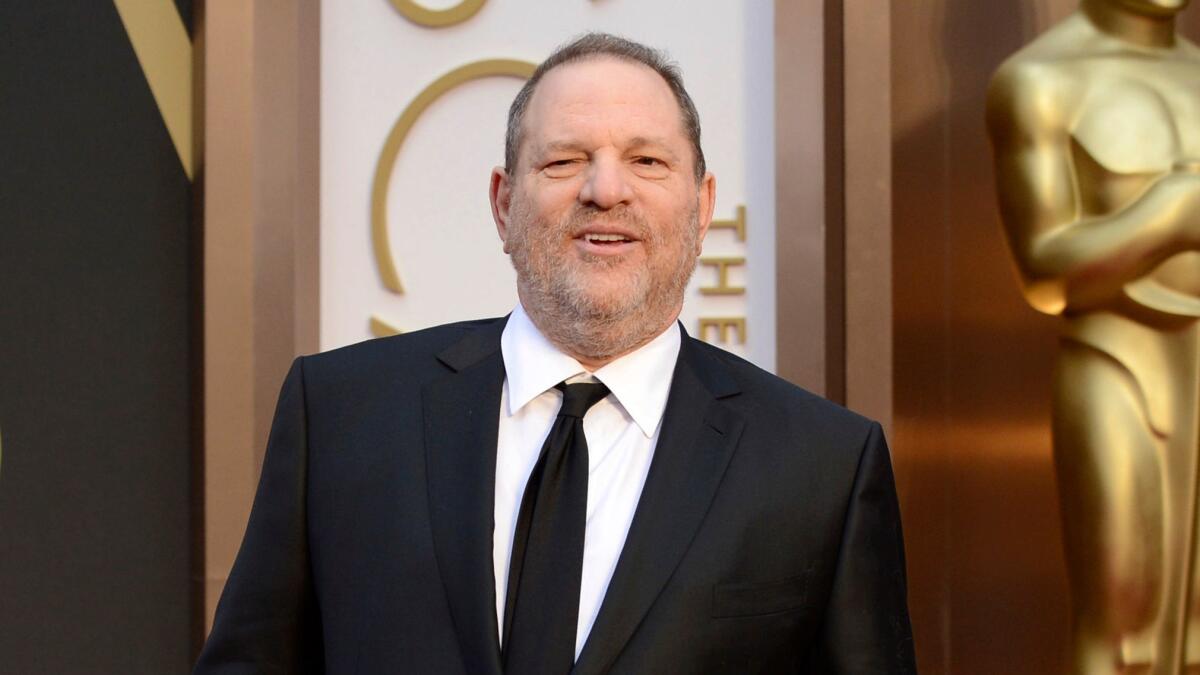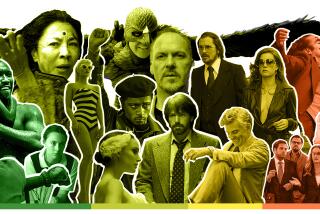Commentary: Why the Oscars have lost their mojo — and their relevance

Do the Oscars matter anymore?
The question is sacrilege in this town, where image and myth have so subsumed reality that red carpet scrutiny over what Margot Robbie wears Sunday night will be as intense as coverage of how the Russians interfered with our elections. It will all get rather breathless as media, studios and stars play assigned roles in what in essence is a marketing event dressed up in glamour to celebrate the art of film and ponder who rates a ticket to Vanity Fair’s after party.
That’s not to suggest that movies shouldn’t be recognized. The industry, after all, has been handing out prizes for months. Is anyone fatigued? But this year’s awards come amid rising oceans, sexual abuse scandals and slain schoolchildren. Our country is divided; our president is a Twitter fiend. Our immigrants feel unwelcome and our working poor can’t afford healthcare. We face nuclear threats from multiple sides. We are sinking deeper into debt and have stumbled badly in the eyes of the world.
The Oscars seem insignificant amid the clamor. But they roll along in sequins and swag, offering rehearsed outrage but mostly escape for the collective soul. We have followed them for 89 years, through wars, race riots, recessions, assassinations and other cruelties that have tested our national will. The Academy Awards remind us that films can inspire and, at times, shine wisdom on how we live. Yet despite our insatiable need to conflate, most movies are not “monumental” or “landmark” or anything approaching “genius.”
The Oscars face a number of problems over their relevance. They are not hip or clever enough to draw in the young, and they don’t honor enough blockbuster titles to entice the popcorn set. The show’s political asides, less brave than long overdue, and moments of industry self-deprecation, more calculated than pure, fail to capture, even though they will jab at them, the deeper currents of our visceral #hashtag times.
The American audience for the Oscars has steadily fallen, from 46.3 million in 2000 to about 32.9 million last year. More than 103 million watched the Super Bowl. The Academy of Motion Picture Arts and Sciences estimates worldwide Oscar viewership at several hundred million. That figure is likely a stretch. But even so, there are 7.6 billion people on the planet, 3.2 billion of whom watched the last month-long World Cup soccer tournament.
The ceremony’s three-plus hours can feel as soul-depleting and exhausting as traffic on the 10. The show bobs along on an air of predictability, a shrug of insouciance. If things don’t veer off-script — last year, Warren Beatty opened the wrong envelope in exciting live TV drama that made the Oscars fallible and human — the awards are forgettable: Who won lead actor two years ago? Does anyone remember “The Artist”?
The decline in viewership is in part a symptom of an atomized entertainment universe that has grown from a handful of channels to Netflix, Amazon, YouTube and endless other streaming possibilities. Technology has allowed us to be varied and adventurous in our tastes, and there are fewer movies, “Black Panther” aside, that rise to a shared cultural moment. The renaissance in visual storytelling and our real-time idiosyncrasies are playing on the small screen, where many actors and filmmakers have also migrated.
To be sure, though, movie stars and those in the glow of the paparazzi still fascinate in their Teslas, Champagne and pearls. Shows like the once mocked Golden Globes have fed a seasonal hype driven by horse race odds, speculation and a flood of ads and stories about who’s in the running. But by Oscar night, how much more can be said of Jordan Peele’s zeitgeist, Meryl Streep’s undeniable Streep-ness or Gary Oldman’s Winston Churchill makeup and fat suit?

There has been a shift too in the cult of celebrity. Selfies, Instagram and YouTube have made us our own celebrities; the real ones posing beside us at film premieres and restaurants have become extras in our videoed romans à clef. They don’t seem as otherworldly as they once did. Notions of fame have been reinvented, and the audience has become the star in an endless loop of blurred lines.
President Trump is a master at loops and lines. He will inevitably be lampooned by Oscar host Jimmy Kimmel and others Sunday night, a safe target for Hollywood’s liberal persuasions. But Trump, a former reality show star, is — like many who will collect statuettes inside the Dolby Theatre — a celebrity. They may disdain the man and be repelled by his politics, but he, like them, was made by the entertainment industry. And his base is as dismissive of Hollywood as Hollywood is of him.
Political and social causes will be voiced — Kimmel has been quite outspoken on his late night talk show — between song numbers and acceptance speeches. This is, after all, an era of reckoning: #MeToo, #TimesUp, #OscarsSoWhite and #NeverAgain, which arose after the recent school shooting in Florida that killed 17 students and staff. Some are reminders of Hollywood’s failings over the years at diversity and stopping alleged sexual predators, most notably the man whose name became synonymous with the Oscars, Harvey Weinstein. They illustrate that the industry, despite its high-wattage nature, appears not that much different from the rest of the country.

The Academy Awards, though, have weathered uncomfortable political moments over the years.
In 1973, Sacheen Littlefeather, an Apache actress, was jeered and cheered when she stepped to the stage and announced that Marlon Brando would not accept his lead actor Oscar for “The Godfather” because of Hollywood’s treatment of Native Americans. In 2003, Michael Moore, who won the documentary feature Oscar for “Bowling for Columbine,” drew loud boos when he condemned President George W. Bush for the Iraq war, saying, “Shame on you!”
ABC and the producers would prefer a night that doesn’t stray too far from glorifying the art of film and showcasing beautiful stars. But if the Oscars really want to be relevant, perhaps someone might address criticism of on-screen gun violence in wake of the recent mass shootings in Parkland, Fla. and other places.
Don’t count on it. The Oscars live in a tricky no-man’s land between the real and the imagined. They aspire to be topical but are careful — some would say timid — in what they choose as a cause and how they offend, especially amid our nation’s acrimony and divisions.
That leaves them a few steps — and a degree of courage — behind the times to which they are speaking.
To read this article in Spanish click here
Twitter: @JeffreyLAT
ALSO
Who’s next? High anxiety in Hollywood
Oscar-nominated ‘On Body and Soul’ wonders if love in a dream can survive the real world
Bitcoin promises filmmakers and writers tales of get-rich fever and cyber intrigue
More to Read
Only good movies
Get the Indie Focus newsletter, Mark Olsen's weekly guide to the world of cinema.
You may occasionally receive promotional content from the Los Angeles Times.







